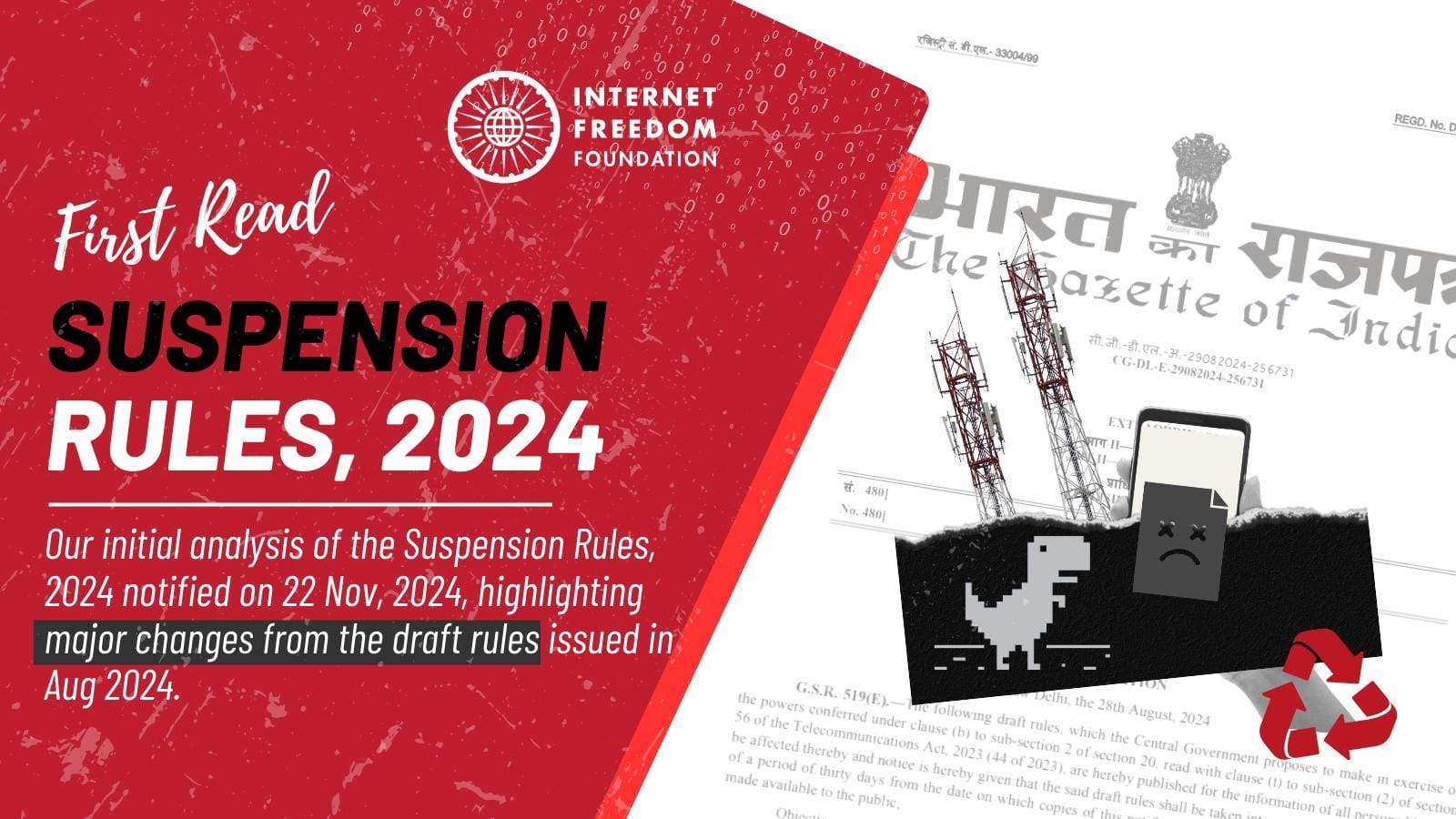
tl;dr
On November 22, 2024, the Department of Telecommunications (“DoT”) notified the Telecommunication (Temporary Suspension of Services) Rules, 2024 (“Suspension Rules, 2024”). These are the second set of rules to be issued under the newly issued Telecommunications Act, 2023 (“Telecom Act”). Previously on August 28, 2024, DoT released the draft Temporary Suspension of Telecommunication Services Rules, 2024 (“draft rules”) for public consultation providing a thirty-day timeframe for inviting comments. IFF submitted detailed comments on the draft rules. It is to be noted that the responses received from stakeholders on the draft Suspension Rules have not been made public by the DoT as of date.
Important Documents
- Draft Temporary Suspension of Telecommunication Services Rules, 2024 (link)
- Notified Telecommunication (Temporary Suspension of Services) Rules, 2024 (link)
- IFF’s analysis of the Draft Temporary Suspension of Telecommunication Services Rules, 2024 (link)
- IFF’s Consultation Response on the Draft Temporary Suspension of Telecommunication Services Rules, 2024 (link)
- The Telecommunications Act, 2023 (link)
- IFF’s first read of the Telecom Bill, 2023 (link)
Background
The Suspension Rules, 2024 have been released in pursuance of clause (b) of sub-section (2) and sub-section (4) of section 20 read with clauses (t) and (u) of sub-section (2) of section 56 of the Telecommunications Act, 2023 (“Telecom Act”). The notified rules seek to supersede the Temporary Suspension of Telecom Services (Public Emergency or Public Safety) Rules, 2017 (“2017 Rules”). Notably, the Suspension Rules, 2024 will not override existing suspension orders issued under the old regime and the terms and conditions of existing orders will continue to apply till the end day prescribed by such an order.
Key changes in the Telecom Temporary Suspension of Services Rules following public consultation
The core provisions of the Suspension Rules have been preserved from the draft version, though some changes have been introduced in the legislation after the public consultation.
Suspension order can only be a last resort
In a laudable step, the government has included Rule 3 sub-rule 4 in the Suspension Rules, 2024, the provision implies that a suspension order, as described in sub-rule (1), cannot be issued unless the authority responsible for making the order has carefully evaluated the situation and determined that the objectives outlined in Section 20(2) of the Telecom Act cannot be achieved through any other reasonable or alternative methods.
This practically signifies that authorities can now order shutdowns only when no other reasonable means are available “in the interest of the sovereignty and integrity of India, defence and security of the State, friendly relations with foreign States, public order, or for preventing incitement to the commission of any offence”. Before resorting to a suspension, the authority must consider whether there are other feasible approaches to meeting the goals specified in the law, and only if these alternatives are deemed ineffective or insufficient, should the suspension order be considered. This will ensure that suspension orders are used as a last resort after exploring all other reasonable options.
Inclusion of type of telecommunication service
Rule 3, sub-rule 2(b) in the initial draft rules stated that any suspension order issued must clearly define the geographical areas. In the recently notified Suspension Rules, 2024, the government has taken a step further by specifying that, in addition to the geographical area, the type of telecommunication service being suspended must also be clearly defined. This provision helps enforce specificity in suspension orders. Such safeguards, at least on paper, did not exist in the 2017 Rules. The Supreme Court also highlighted the exceptional nature of internet shutdowns in the Foundation for Media Professionals v. U.T. of J&K, MA 1086/2020, where it ruled that internet suspension orders must be territorially limited and cannot be permanent— a principle now reflected in the Suspension Rules, 2024.
Calendar days have been removed from the notified rules in toto
In the initial draft rules, it was specifically mentioned that a suspension order shall not exceed fifteen (15) calendar days and the concerned review committee shall meet within five (5) calendar days of issuance of any suspension order. This implied that the period allocated for the suspension order and for scheduling the Review Committee meeting was reduced from 5 working days (excluding weekends and holidays) to 5 calendar days (including weekends and holidays). In other words, the timelines implied and included consecutive days, regardless of whether those days were weekdays or weekends.
However, in the Suspension Rules, 2024, the government removed the specification of calendar days and reverted to the previous practice of assessing days based on working days. Such a timeline hinders the timely review of suspension orders, affecting the overall effectiveness of the oversight mechanism. Since most suspension orders are of shorter duration, typically around 1 to 3 days, by the time the order is forwarded to the Review Committee, the internet suspension might have already ended. This delay renders the review process merely an academic exercise, as it would be unable to halt an ongoing internet or telecom suspension.
Some Minor changes
The Union government tweaked the name of the Rules itself, in the draft rules the name was Temporary Suspension of Telecommunication Services Rules and now it is Telecommunications (Temporary Suspension of Services) Rules, 2024.
Additionally, in the draft rules, it was mentioned that the rules will also supersede the Temporary Suspension of Telecom Services (Amendment) Rules, 2020 under the Indian Telegraph Act, 1885. However, this Amendment has not been included in the notified Suspension Rules, 2024.
Steps in the right direction but insufficient overall
In a commendable step, the government retained the provision of the draft rules which mandated that all suspension orders must be published. It was noted in Anuradha Bhasin v. Union of India [(2020) 3 SCC 637] (“Anuradha Bhasin”) that one of the lacunae in the 2017 Rules was that it did not have an explicit requirement for publication of suspension orders [paras 104-105]. Consequently, in line with the principles of natural justice, the Supreme Court in Anuradha Bhasin read in the requirement of publication of suspension orders––so that affected parties could effectively challenge the same before the appropriate authority [para 104]. The Anuradha Bhasin judgement also held that the suspension orders should be made available through “some suitable mechanism” [para 104] –– However, the notified Suspension Rules, 2024 do not explicitly prescribe the mode and mechanism of publication of suspension orders.
The Review Committee’s power to set aside suspension orders under the draft rules has been retained in the notified rules. This is an empowering change, as under the 2017 Rules, the Review Committee could merely "record” its findings and did not have the power to set aside suspension orders. Anuradha Bhasin also held that in addition to evaluating conformity to procedure (i.e. Section 5(2) of the Telegraph Act, which is equivalent to Section 20(2)(b) of the Telecom Act), the Review Committee must also evaluate if the suspension order is in consonance with the proportionality principles [para 108]. However, this requirement/ safeguard is still missing in the Suspension Rules, 2024.
Our Persisting Concerns
Apart from these changes, IFF asserts that the Suspension Rules, 2024 ignores most of the recommendations and concerns raised in its consultation response.
Some concerns pertaining to the independence of the Review Committee in terms of the composition still persist. The Suspension Rules, 2024 have not incorporated suggestions made by the Standing Committee on Communication and Information Technology (“IT Standing Committee”) in its 2021 report on internet shutdowns. These recommendations included ensuring a diverse composition of the Review Committee by including more non-official members such as retired judges, members of the public, and potentially even local MPs and MLAs. The IT Standing Committee also suggested that authentic data on the decisions taken by the Review Committee must be maintained.
However, the composition of the review committee continues to be the same as the 2017 Rules which indicates that there is a lack of necessary independence required to conduct an impartial review as the committee tasked with reviewing the order issued by the issuing authority includes members of similar rank within the same branch of government (the Executive). The Suspension Rules, 2024 completely fail to provide a mechanism for affected parties to present their case before the Review Committee.
Additionally, the 15 day cap on the operation of Suspension Orders and 5 day timeline for review Committee Review remains the same as the draft rules. IFF has raised concerns regarding prescribing the 15 day cap which effectively does not serve as a safeguard against internet or telecom suspensions that, in effect, operate for prolonged or indefinite periods.
It is important to highlight that this 15 day limit pertains to the duration of an individual suspension order rather than the cumulative duration of an internet suspension. There is an urgent need to reduce the 15-day limit and instead prescribe a reduced limit on the number of days for which an internet shutdown may be imposed cumulatively or through successive orders.
Even the 5 day timeline for the review process is essentially pointless because, by the time it reaches the committee, the internet suspension might have already ended. Therefore, there is no mechanism instituted to keep a check on an ongoing internet or telecom suspension on a priority basis.
Furthermore, the Suspension Rules 2024 do not explicitly require the publication of Review Committee orders. In Anuradha Bhasin, the Supreme Court held that all orders issued under the 2017 Rules, including the Review Committee orders must be published [paras 104-105]. Access to Review Committee orders is essential for affected parties to contest suspension orders before the relevant forum, promoting transparency and accountability in the process.
As India continues to lead the world in the number of internet shutdowns, now for the sixth consecutive year, the urgency for reform cannot be overstated. Although the Suspension Rules 2024 under the Telecom Act bring some minor improvements, they still fall significantly short of providing the strong safeguards needed to protect our constitutionally guaranteed freedoms.

